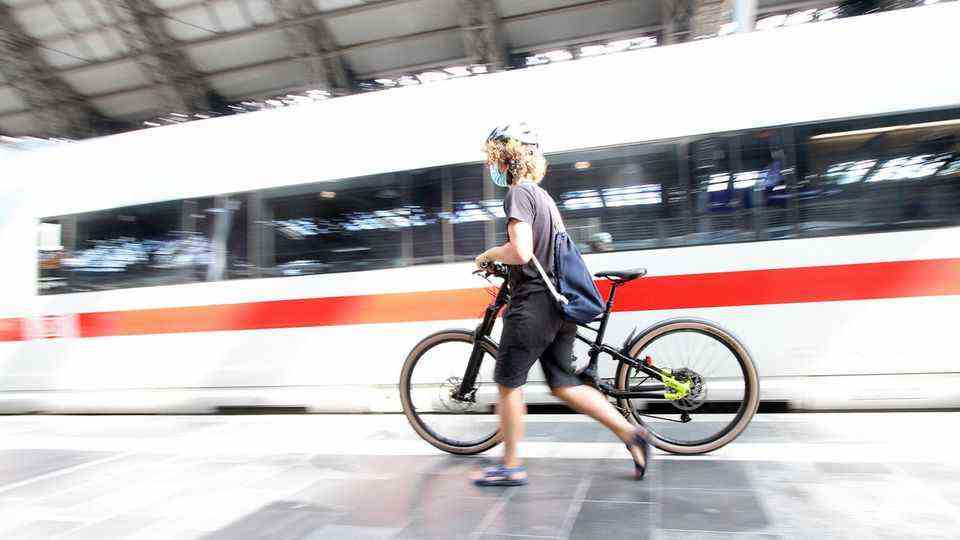Climate-friendly travel
Less CO2 pollution: How tourism is looking for concepts for climate protection
Contrails in the blue sky (photomontage)
© Imago Images
Climate change is presenting the tourism industry with new challenges. From the point of view of climate protectionists, simply compensating for air travel with donations is no longer enough.
Compensation for air travel through donations for climate protection projects, reducing energy consumption in hotels or reducing the amount of waste: climate change is presenting the travel industry with new challenges. According to a study referred to by the Federal Environment Agency, tourism causes around 5 to 8 percent of global greenhouse gas emissions. The industry’s “Achilles’ heel” is mobility, currently primarily flying, says Norbert Fiebig, President of the DRV travel association. “The goal is: CO2-neutral mobility.”
At the moment, many organizers are primarily focusing on offsetting the CO2 impact via Atmosfair, Myclimate or other providers where travelers can offset flights and cruises by donating money. This is used to support projects around the world, for example to save energy or generate green electricity. With some tour operators, the contribution is included in the travel price, while others offer holidaymakers voluntary compensation when booking.
But that’s not enough, according to Antje Monshausen from Tourism Watch at Bread for the World: “In the long-distance travel segment, where flights usually cannot be avoided, vacations should be less frequent and longer, in order to reduce the number of flights.” In recent years, the length of stay has shortened, while at the same time the number of trips per person has increased. “We are finding that all savings are being eaten up by the growth in air traffic. We need technological solutions and at the same time a reduction in flights,” says Monshausen.
In order to reduce harmful emissions, organizers should also offer other products on medium-haul routes in Europe, for example more trips by train, warns Monshausen. Environmental experts generally advocate the shortest possible travel distance, if possible by bus or train.
The reality so far looks different
According to DRV data, the share of the two means of transport for vacation trips has been around 6 percent each for years. Even the favorite island of the Germans, Mallorca, can be reached without a plane. Atmosfair calculates that vacationers from southern Germany, for example, need 11 to 14 hours by train and ferries, which, with a few exceptions, are powered by fossil fuels.
Sustainable travel: is that even possible? We have ten tips for you
10 images
But what about the willingness to pay more attention to climate protection on vacation? In a survey commissioned by the DRV last year, 62 percent of those surveyed stated that the climate-friendliness of a trip was important or very important to them. 46 percent would be willing to pay a higher price for a flight if it compensated for CO2 emissions.
42 percent would even accept a longer arrival and departure time. However, only 23 percent actually found out about ways to make the trip as environmentally friendly as possible.
This is where the travel group DER Touristik comes in: “By collecting a CO2 footprint, which we want to convey to customers in a transparent manner, we want to control booking behavior,” said Central Europe boss Ingo Burmester recently. The industry association DRV is also in favor of providing all trips with a traceable CO2 footprint.
In addition to the arrival and departure, the accommodation of sun-seekers and their activities at the holiday location also have a negative impact on the climate. In addition, the construction and maintenance of hotels, roads, amusement parks and the like consume resources.
Future laboratory for sustainable tourism on Rhodes
Industry leader Tui, in cooperation with the government of the southern Aegean, wants to turn the popular Greek holiday island of Rhodes into a future laboratory for sustainable tourism and thus create blueprints for other destinations. For example, the ecological footprint of tourism on Rhodes is to be significantly reduced through new concepts for energy, water and waste management.
“We need an understanding of how all the components can come together,” said Tui boss Fritz Joussen when presenting the project. “Sustainability is not just environmental sustainability. It must also be viewed in an economic and social sense.” Therefore, the participation of local people should also be promoted, for example through new job opportunities.
In the end, according to the Greek Minister of Tourism Vassilis Kikilias, all actors could benefit – “from the individual provider who sells coffee to his customers, to the people who rent out cars and boats, to the winegrowers, to the holidaymakers themselves”.
Also read:
– A lot of hot air: The dispute over the unnecessary 18,000 empty flights in the EU
– Is the kerosene tax a climate saver – or pure populism?
– Marina Bay Sands: Singapore’s coolest hotel with the Instagrammable pool


